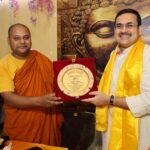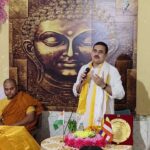Contemporary Dimension of a Civilisational Question
- By : Anirban Ganguly
- Category : Articles
In his “Reply to the Madras Address” in 1897, after four hectic years in the West where he reversed, to a great extent, the negative narrative of India that had been ingrained in a section of the intelligentsia by groups professing to labour for spreading the “light” of a particular religion among lesser mortals of India, Swami Vivekananda made certain observations, perhaps unpalatable to the politically correct or the opportunist, but which nevertheless continue to possess a contemporary dimension.
“It is not true that I am against any religion,” argued Vivekananda, “It is equally untrue that I am hostile to the Christian missionaries in India. But I protest against certain of their methods of raising money in America. What is meant by those pictures in school-books for the children where the Hindu mother is painted as throwing her children to the crocodiles in the Ganga? The mother is black, but the baby is painted white, to arouse more sympathy, and get more money. What is meant by the pictures of huge cars crushing over human beings?”
Vivekananda also recalled how he heard a missionary preach in a Memphis village that “in every village of India there is a pond full of the bones of little babies”. What have the Hindus done to these disciples of Christ that every Christian child is taught to call Hindus “vile” and “wretches” was his exasperated question. The Swami also articulated a fundamental dilemma that he faced or saw prevalent, “if a Hindu writes one such line against the Christian religion, the missionaries will cry fire and vengeance”. Strange, isn’t it that some situations or civilisational questions refuse to address themselves even after more than a hundred years?
In his civilisational essays on India, Ananda Coomaraswamy, another indefatigable voice speaking up for the Indic traditions, also talked of his being disturbed with the general attitude of the Christian missions in India. “Mistakes have arisen,” wrote Coomaraswamy, “when the preacher has forgotten that no truth is complete or absolute, only relative.” For Coomaraswamy, the “garment of the soul” had to be “various, in relation to individual nature and environment, no less than must be the garment of the body”. The problem with the “Christian missionaries”, he argued, was that they were “generally bent upon the regimentation of the garments both of soul and body”. When after a “painfully intense discussion” a missionary once told him that “the light that is in you is darkness”, Coomaraswamy, embodying the essential Hindu spirit, recalled how he could never dream of “thinking that of him”.
Even the usually reticent Sri Aurobindo did not fail to note how the “mark of a certain type of Christian literature” was characterised by an “intemperate drunkenness of denunciation and vomit of false witness, hatred, uncharitableness and all things degrading and unspiritual and unclean”.
In his opus Asia and Western Dominance, administrator and historian K M Pannikar devoted an entire section to discussing the activities of the Christian missions in India and noted how because of their peculiar brand of activism “intolerance of things Indian became the characteristic feature of missionary zeal in India and any compromise with Hindu life or religion was avoided”.
What really pained the above seers and thinkers was the spirit of intolerance and denunciation that was being spread in the name of disseminating the “light of truth and peace” among a land and people who were civilisationally known for their mildness and their assimilative and compassionate spirit.
It is unfortunate, thus, that a politically interested group opportunistically united to outshout the renewed call for a debate of this unsolved but crucial civilisational question in India. Follow him on

















